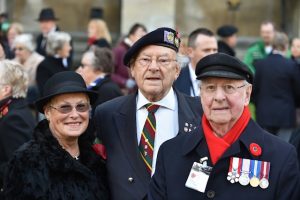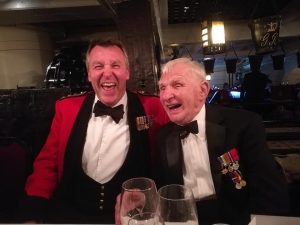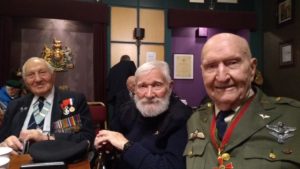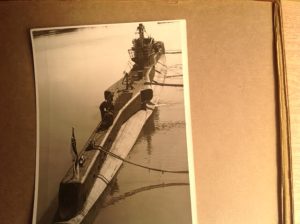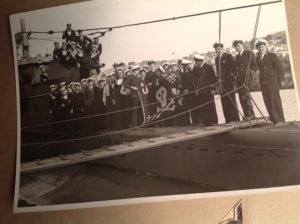Leonard Hobbs Leg.d’hon – Royal Navy
I was one of the more fortunate ‘matloe’s’ as it happened i was at home at the time for 4/5 days whilst the ship (HMS FERNIE) was having a boiler clean. I received a telegram from the ship to take an extra three days leave. As far as I remember my Mother,Father, brother and myself got a train from Barking Station into London probably alighting the train at Blackfriars Station and walking down Fleet Street towards Trafalgar Square. It seemed everybody had the same idea everywhere people were celebrating the end of a very long war. We managed to get to Trafalgar Square which was just one mass of very happy rejoicing people. However it was not forgotten and it was on the lips of most people that the were very many friends who at that time could not rejoice with us and some poor souls who unfortunately would no longer be with us. My Father worked at the Daily Telegraph in Fleet Street and had to go to work that night so we finished up in their Canteen which was licensed, thankfully.
Kenneth Vincent Loftus
In 1943 I joined the Army and was posted to 6 Border Regiment based in Windermere where after a few months we commenced various training programmes to prepare for the D-Day landings. Although having witnessed some of the horrific scenes first hand nothing could prepare us mentally, emotionally or physically and these memories would haunt us for our lifetime.
I along with my fellow soldiers landed on Gold Beach on 6th June 1944 where we spent the next few weeks clearing mines, protecting the beach and bringing in supplies. My regiment was relatively lucky at this time, as casualties were low and we remained in the Normandy area until 26th June when we were involved the Epsom Operation in Cain to attempt to try and take back Cain from the German occupation. This first attempt failed and at this point our regiment was disbanded to allow reinforcements to be sent elsewhere.
Most of us went to the 6th Battalion Royal Fusiliers where in October 1944 we helped with the recapture of the village Baron-Sur-Odon and other surrounding areas including Hill 112 this was known as Operation Jupiter which lasted a couple of days.
The Operations in Peel started and in November 1944 we moved to Asten in the Netherlands and by early evening we had taken up our positions in the Southern edge of a forest south of Liessel, here the Battallion suffered heavy casualties in Meijel alongside the 15th Scottish Division. We continued to battle through Tilburg and surroundings areas where we were captured and taken as prisoners of war. I was to spend the rest of my time at Stalag 12 in Limburg near Frankfurt repeating my POW number on demand 90676.
I returned to England after VE day in May 1945, with the support of the Red Cross. I was just glad to be alive and home.
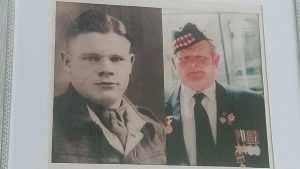
Jean Beall WRNS
I served as a Wren during the war and had been stationed in Dover Castle and in Rye.
By VE Day I had been posted to Hope Town, Queensferry where, as Leading Wren, I was working on a section managing supplies for minesweepers. When VE Day arrived we were very excited. In the evening we went to a
dance in Edinburgh and had a great time. It felt good to know that the war in Europe was over, although we knew
that it was still going on in the Far East. At least for today we could celebrate before getting back to work in the morning. It was a day of mixed emotions as we were glad that the war in Europe was over but sad that so many young men would never come home again.
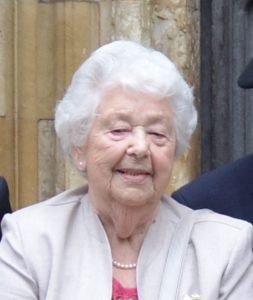
Wally Beall RN Leg d’hon
On D Day I was a Wireman on a tank landing craft LCT836 and when we went into action I was also the port Oerlikon gunner. We were in the first wave of landing craft delivering Sherman tanks to Utah Beach for the American forces. We made a number of trips across the channel and, as the war progressed through France and Belgium, we continued to deliver supplies through Le Havre and Dieppe until a major port had been captured and supplies could go in by ship.
By VE Day our task was completed and the landing craft was taken out of service. I was then sent from my base on the south coast to Queensferry in Scotland to attend a promotion course to be made Leading Wireman. On VE Day I was travelling with a couple of dozen sailors to Scotland by train and we had to change trains in London. We could see the parties and celebrations going on in the streets and we had a debate about possibly going AWOL and joining
in. In the end we thought it was too risky, so boarded our train to Scotland. All the way up to Scotland we could see the celebration bonfires burning. We had seen a lot and been very busy since D Day and we were glad that it was all over but sad that we had missed the celebrations
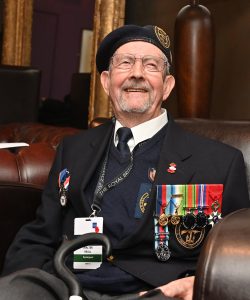
Photo Mark Allan
Fred Lee Leg.d’hon
Fred Lee Leg.d’hon Royal Navy Leading Stoker CKX613567 HMS Nith River Class Frigate, Head Quarters ship, Landing Craft.
My journey to VE Day 1945 was quite exciting we left Scotland in February 1944. Spent the 4 months mostly at night on exercises out of Weymouth and then the Solent (Isle of Wight).
On 6th June 1944 landed troops on Gold Beach (Jig & Green sectors ) at 0725hrs. On 23/24 June at midnight we were hit by a German guided bomber. 8 Seamen were killed and 26 injured.
After repairs to the ship on the Isle of Wight we went back to the Normandy Beaches until the end of October.
The Ship then returned to Scotland for major repairs.
February 1945 we left for the Far East in a convoy of various ships on the Bay of Biscay (my first taste of rough seas). We lost one Seaman that night.
We stopped at Gibraltar, Bizerta, Port Said and Aden, then through the Suez Canal to Bombay. After leaving Bombay we had five LST’s with us and on the way to Rangoon I discovered that my brother Frank was on board one of
them.
After the assault on Rangoon which began on 29th April 1945 we stayed in Rangoon until 13th June to carry on further operations.
Eventually we arrived home on 29th March 1946.
So to sum it all up we NEVER celebrated VE DAY 1945 – we were too busy!
Yes I did spend some time with my brother Frank in Rangoon and Trincomalee
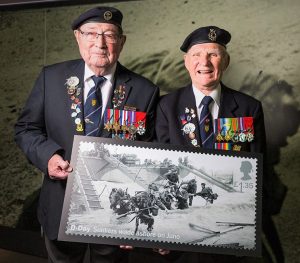
Reg Charles Leg.d’hon
Reg Charles Leg.d’hon Corporal 1st Battalion Oxfordshire and Buckinghamshire Light Infantry
After serving for 10 months in the 1st Battalion Oxford and Bucks Light Infantry and sharing in the Normandy Campaign, the Liberation of Holland, the Battle of the Bulge, the Battle of the Reichswald Forest followed by crossing the River Rhine and then continuing through Germany I finally arrived at Hamburg where we celebrated VE Day.
The end came as a surprise and the actual celebrations amounted to being relieved and grateful to be able to live at peace and not ‘Digging, Dashing and Dodging’ gunfire.
I remember General Sir Miles Dempsey speaking to us, there were two thousand men of the 53rd Welsh Division, we were at the State Theatre in Hamburg, he thanked us for fighting the enemy and reminded us that the victory won in war is in no way lost in peace, I have never forgotten those words or that moment in time.
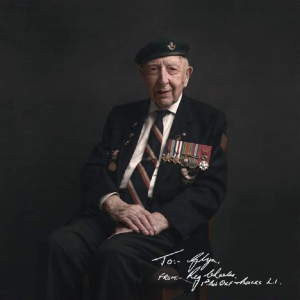
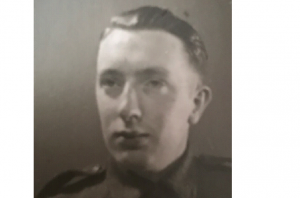
Cyril Elliott Leg. D’hon
At the beginning of May 1945, Cyril had reached Hamburg and several days later, his officer told him he had to take a lorry all the way back to France to pick up some personnel. Cyril set off on the journey and on reaching Lille in Northern France, he could not believe the sight that met his eyes. Crowds were in the streets celebrating and shouting “Le Boche fine”. Cyril parked his lorry and joined the celebrations and “had a few beers”. He never found the personnel he intended to pick up and returned to Hamburg.
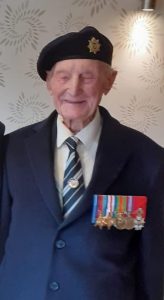
Les Giles Leg. D’hon
Les was in Schleswig Holstein near the Danish border when the war ended. The news was met with complete disbelief and a feeling of relief by Les and his comrades and they all continued with their duties and never considered celebrating. They remembered those comrades and friends lost and left behind in the advance from Normandy.
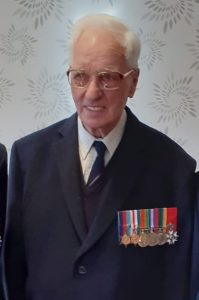
Douglas Austin Leg. D’hon
In the days leading up to VE day Douglas and his battalion were in Lubek,northern Germany.Their C.O. addressed the battalion and told them that “It was nearly over,they should not go looking for trouble and keep their heads down”.On the day the war ended,Douglas had gone out looking for eggs and when he returned,he was told that the war was over.There was no celebrations,just disbelief that it was over.He remembers that a curfew was imposed and any Germans breaking the curfew were locked up,under guard, in cattle pens for the night.The Germans gave no trouble as it was obvious that the were completely demoralised and deflated.
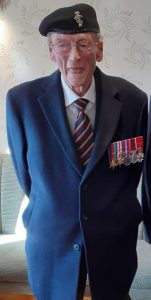
Gordon Drabble Leg. D’hon
Gordon received wounds in the battle for Thury Harcourt and when Germany surrendered he was stationed in Ashford, Kent, training young men who had manned Ack Ack guns how to be infantry men, to prepare them for active service as relief troops.
When they were told that the war in Europe was over their was a feeling of relief, but they did not celebrate as they were very much aware that we were still fighting the Japanese and stories of the horrors of the concentration camps had started to filter through.The stories shocked them.
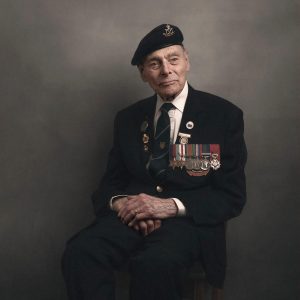
Kenneth Turner Leg. D’hon
At the age of 16 I joined the 70th Battalion Kings Royal Rifles having jacked my age by two years. You had to be 18 to join. I was selected to be in the demonstration platoon. All very nice but it involved a heck of lot of marching. I decided that if I was going to war I wasn’t going on foot. By now I had become a very proficient signaller. Morse code 18 words a minute etc. This made me ideal tank crew material and I got a transfer to 7th Battalion Royal Tank Regiment. I was selected to join the reconnaissance troop. We had Stuart tanks. I was trained Driver operator loader. It was not designed to do battle but it was the fastest vehicle on the battlefield. Useful for getting out of trouble. We landed D+12 in Normandy and the tank was blown to smithereens on 17th July. I survived, my crew were killed. I was air lifted to England with multiple shrapnel wounds. Upon recovery, me and some of the shrapnel was sent to Italy on an old P&O boat called the Chitral. I was sent forward to drive Churchill Arks to help the advance over the numerous water courses up the east coast. When the war ended I was in Bari and was flown back to England in the bomb racks of a Liberator bomber.
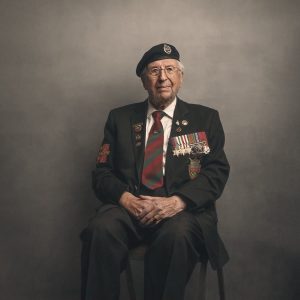
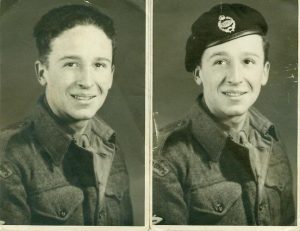
Frank Baugh Leg.d’hon
My name is Frank Baugh. I am 96 years of age. I joined the Royal Navy in June 1942. I was the signalman on board a Landing Craft LCI(L)380.
After taking part in the DDay landings we continued to take many infantrymen to the beaches. We followed the army as it fought its way towards Germany.
As they cleared the ports they found that the Germans had scuttled all of the ships so that our large troop transports could not get in. Because our craft had a flat bottom we were able to go in, so we continued to take troops to each port until the Germans surrendered. On the day of surrender we were leaving the port of Ostend carrying British troops, who had been fighting for many months, back to Tilbury. When we got the news it caused such joy to everyone on the ship that it was unbelievable. Everyone shook hands, clapped each-other on the back, and started singing, it a was a tremendous feeling. One of our gunners was so excited that he fired his Oerlikon into the air. Luckily a Lancaster bomber which was passing overhead at that moment, managed to swerve. He dropped 2 flares to let us know he was not the enemy. I acknowledged by firing two flares in his direction. He gave a wiggle to show there were no hard feelings. The euphoria continued all the way back to Tilbury.
Shortly after getting back the Prime Minister Mr Winston Churchill declared the following day would be VEDay. A day of celebration for the whole country. We knew that it would be a terrific day in London and as we had been given leave a number of us thought that we would go. So myself and 3 shipmates (not realising how far it was) set off to walk there. After quite a few hours we realised that it was too far and by sheer chance we were passing a large public house where lots of people were singing, dancing and having a great time. We decided to join them. They welcomed us with open arms and made a real fuss of us, so much so that when after a few hours we got up to return to the ship, they would not let us go. A couple who had been sitting with us said that it was too far for us to go that night and insisted that we should stay with them overnight. When we protested they told us that they had a son who was in the Royal Air Force and hoped that someone was doing the same for him.
We were intrigued to be taken to a large department store, we went in through the main doors and were lead through the sales floor to lifts at the back which took us to their rooftop apartment. It transpired that they were the caretakers. We had a very comfortable nights sleep, our first in a real bed for many months. After a delicious breakfast we were taken back to our ship in the stores delivery van. We could not thank them enough and whenever I think of VE Day I remember their kindness.
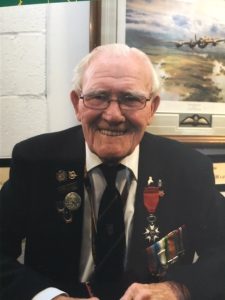
Don Sheppard Leg.d’hon
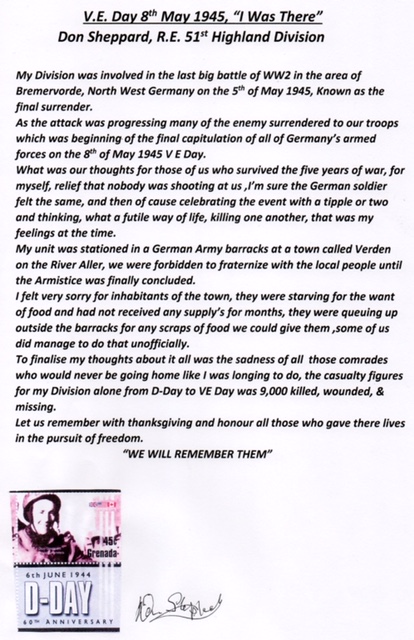
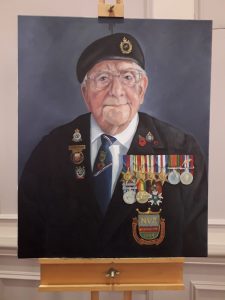
Harry Rice Leg.d’hon
Harry was serving on HMS Eastway as a Signalman in the Royal Navy.
Just before the German Surrender, the Ship was in he Mediterranean.
2 weeks before VE day the ship left Gibraltar to sail back to Liverpool. When passing the Bristol Channel They were made aware of HMS Bulldog searching for a German Submarine believed to be in the area. Whilst he was on lookout patrol Henry reported seeing the wake of a Torpedo heading toward the Eastway. Luckily although it was only a few feet away. It passed the bow of the ship and they survived unscathed. Even at this late time in the war, the dangers still existed.
After a quick visit to Liverpool to pick up supplies. HMS Eastway was deployed to Newcastle. This meant having to go around Scotland and into the North sea. Obviously after the experience near Bristol everybody on board was on high alert.
Harry arrived in Newcastle the day before VE day. This enabled the ship to receive some well needed maintenance.
The surrender was announced and as a crew they thought they could all go ashore to celebrate. This however was not the case. Harry and approx half of the crew had to stay on board as the Ship was still classed as operational.
As you all know VE day meant the end of the war with Germany. But not with the Japanese.
Soon the order came that they had to sail to Ceylon, now Sri Lanka to a port called Trincomalee. They picked up troops and then Sailed on to Rangoon in Burma now called Myanma. My final destination for the war was in Singapore shortly after the Japanese surrender.
I had survived. HMS Eastway then sailed back to Sri Lanka where I was released from the crew and waited to be repatriated back to England. With many other servicemen I waited to find a ship that would get me back home. Eventually I boarded HMS Formidable and arrived back in Portsmouth October 1946. I was 20 years old
Overall I was a very lucky man compared to other shipmates and servicemen. I as many will say. Was a lucky man. My service in the Navy at this time was in someway the making of me. The comradeship and trust you had with your shipmates helped you through the dark and sometimes dangerous times. And finally in traditional terms
I was a Jolly Jack Tar who has never lost my pride in what I did
Henry Rice RN HMS Eastway
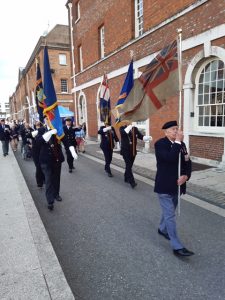
William Blount Leg.d’hon
I was a shell loader on LCGL (Landing Craft Guns Large) No 939 to France and No 449 to Singapore, Burma and Sumatra. On board were 2 x 4,7” ex-destroyer guns and 2 Oerlikon guns
We were in Singapore on VE Day and on VJ Day formed the Guard of Honour when Earl Mountbatten (later Lord Mountbatten) accepted the surrender of the Japanese.
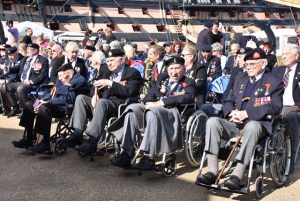
Patrick Thomas Leg.d’hon was on HMS Thule
On VE Day we were getting ready for the next patrol in the Malaca Strait. A 1500 mile trip from Trincomalee to get to our Billet (Patrol Area) We were happy the war in Europe was over but apprehensive about our future in the Far East.
Mervyn Kersh Leg.d’hon
On 7th May 1945 I was ordered to catch a train from Hanover, in central Germany, and go to Bruges in Belgium. I was then to continue to the UK where I was to prepare to be part of the invasion of Japan just as I had been for Normandy.
I got on the train which had been boarded up so I couldn’t see out and there was only a dim electric light in the carriage. That was because there were German boys who had been given guns, to shoot any Allied soldiers they could see. The boarding on the windows protected us in the train.
I spent most of the 30 hours sleeping or reading as we had no radio.
It was only when we reached Bruges in the morning of the 9th May, and got off the train, that we heard the wonderful news that the Germans had surrendered unconditionally – the war was over in Europe.
All the celebrations had taken place the day before I arrived in Bruges, but the excitement was still going on. A huge fuss was being made of all Allied soldiers but I had to continue my journey to the U.K.
By the time I arrived in London people were already settled down to trying to rebuild their lives and there was still the Japanese war to be won.
I heard all about the singing in the streets and dancing in city centres with complete strangers but I was too late.
I had completely missed the end of the European war. I was the last person in the world to know that the European war was over!
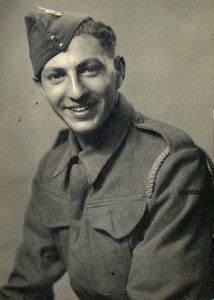
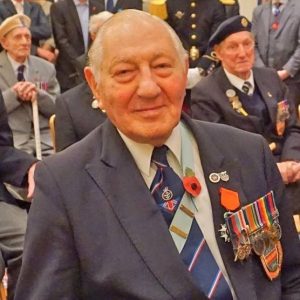
Ken Hay MBE JP Ld’H
I had arrived back in England on Friday 4 May from being a POW, slave labour in a coal-mine in Poland, and having endured the Long March to Freedom (23 January to 20 April), aged 19. Having been processed and kitted out with a new uniform, I reached my home in Barking on Sunday 6 May. Still suffering from the effects of dysentery, I wasn’t able to go far from toilet facilities for a day or two but, come Tuesday 8th – VE Day – things were on the mend. However, presumably due to my ‘change in life-style’, it transpired that I was suffering from some form of temporary amnesia as I had several embarrassing incidents later when people mentioned things that occurred at that time and I had absolutely no recall.
VE Day. I think that, with my family of Mum & Dad, 4 sisters and a younger brother who was nearly 4, I spent the day listening to the wireless (when did it change to radio), telling of events throughout the country and particularly Churchill’s speech “This is your victory”. After tea, as a family we went off to our Catholic Church for a Service of Thanksgiving. I had sent a telegram to my brother Bill, aged 24, who was serving with our Battalion in Great Yarmouth, asking if he could get leave and, as we walking home from Church, I heard running steps, looked back and it was Bill. The last time I had seen him was out on the night patrol in Normandy on 7 July 44, before the battle, when I got captured. Bill got back to our lines but was badly wounded 2 days later and repatriated to England – truly a case of me going East and him going West – but of course I knew nothing of this. We flung our arms around each other and went off home with the family.
Later, Bill wanted to go back up to the town centre to see what was going on so, he and I in uniform, and a civvies pal of his, went out and it seemed like the whole town were out on the streets. At one point a group of girls spotted us and demanded a kiss. This caught on and we were simply besieged with kisses. Ah happy days.
And to think that only 3 weeks before, I was unwashed, unshaven, covered in lice and very weary after walking over 1,000 miles. It’s a funny old world.
From Ken
